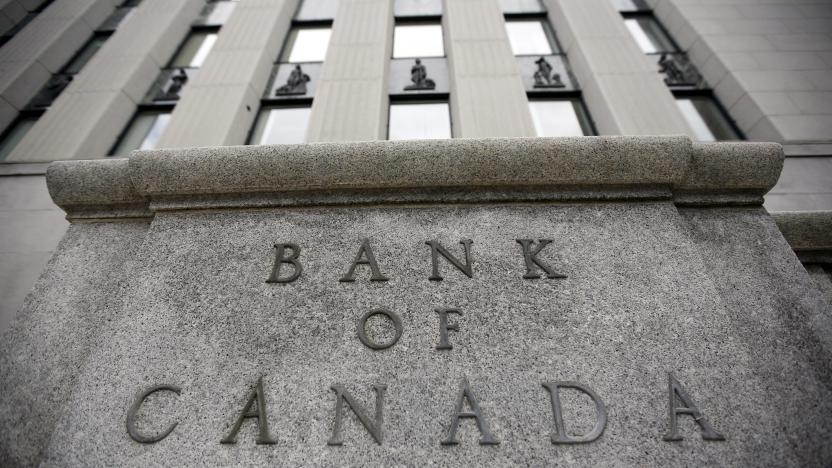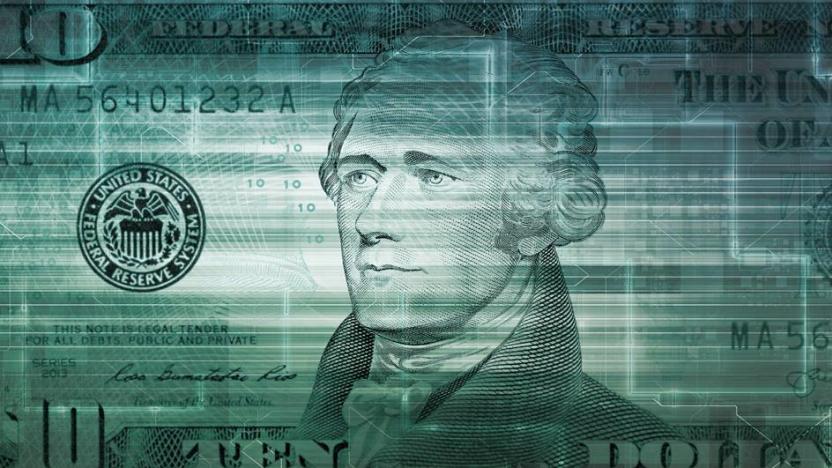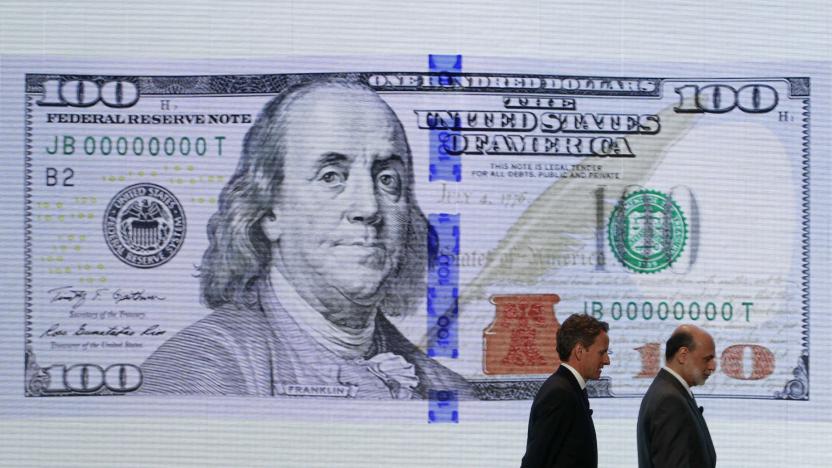digital currency
Latest

Bank of Canada asks for public feedback about a national digital currency
The Bank of Canada wants the public’s opinions on a potential digital Canadian dollar. Although the country’s central bank says a national digital currency isn’t yet needed, it wants to remain flexible and ready if that ever changes.

Boston's Federal Reserve says it has solved technical challenges of a 'digital dollar'
The US Federal Reserve is continuing its research into a "digital dollar" and has unveiled a technical specification for how it might work.

The US Federal Reserve begins looking into its own digital currency
The US Federal Reserve is took a step toward developing a digital currency as it announced plans to publish a research paper on the subject.

The UK is considering starting a digital currency
The Bank of England and HM Treasury are jointly exploring a central bank digital currency that would co-exist alongside traditional cash and deposits.

You can now spend China's digital currency at an online store
JD.com has become the first online store to take China's official digital currency, although it's not quite ready for prime time.

China held a $1.5 million lottery to test a new digital currency
China is taking its digital currency tests to a new level by giving away more than 10 million yuan ($1.5 million) in a new lottery.

Steven Seagal settles with SEC over undisclosed bitcoin promotions
It seems that martial artist and actor Steven Seagal isn't above the law. In 2017, he touted the initial coin offering (ICO) for Bitcoiin2Gen (B2G), a digital currency that sounded shady right from the start. Seagal didn't disclose the fact that he was paid by B2G to encourage his fans to buy into the bitcoin, which is required by law when a currency qualifies as a security. (B2G didn't even bother to register as a security, which resulted in the state of New Jersey issuing it a cease-and-desist order.) The actor has agreed to pay $157,000 in disgorgement plus a $157,000 penalty.

Telegram hasn’t given up on its ‘Gram’ cryptocurrency
As Facebook's cryptocurrency Libra faces challenges from legislators, another social platform is getting ready to launch its own digital currency. According to a report in the New York Times, Telegram is aiming to launch its own coin, the Gram, within the next two months.

Facebook’s Libra Association is being investigated by EU antitrust regulators
Facebook's Libra cryptocurrency project is being probed again, this time by European Union antitrust regulators. The European Commission said it is "currently investigating potential anti-competitive behavior," related to the Libra Association, Bloomberg reports. In a questionnaire sent out this month, the EU authority expressed concerns that Libra would unfairly shut out rivals.

Lawmakers want to block tech giants from offering digital currency
It's been one month since Facebook (and its partners) announced plans to launch Libra cryptocurrency. Already, US lawmakers are calling for Facebook to pause those plans. Now, some legislators want the company to stop altogether. According to Reuters, the Democratic majority of the House Financial Services Committee drafted legislation that would prevent big tech companies from functioning as financial institutions or issuing digital currencies.

Bitcoin bank entices mom and pop with insurance, fraud checks and no fees
If Bitcoin is meant to be an anonymous, decentralized currency that is free of intermediaries and national restrictions, then today's launch of a new Bitcoin bank, called Circle, might seem deeply antithetical. Circle's website does its utmost to look like that of an ordinary financial service, using words like "withdrawing," "depositing" and "digital money," instead of the usual terms about buying and selling Bitcoins. It follows US anti-money laundering rules, requiring users to identify themselves, and it expects you to connect your Bitcoin account to your normal credit card or bank accounts. Crypto-currency purists just aren't going to dig it, but then again Circle claims to offer some serious advantages that are missing from other, more direct approaches to Bitcoin banking.

Bing now shows how much your Bitcoin is worth in other currencies
While some may be opposed to the idea of Bitcoin, others are doing all they can to adjust to the recent digital currency rush. Today, Bing, in partnership with Coinbase, announced it has added support for Bitcoin within its currency-conversion tools. Simply put, you can now use Microsoft's search engine to see what the value of your new-age money is in, say, dollars, pesos, euros or any of the other 50-plus currencies Bing has indexed. And it's all done in real time, too. No Bitcoin? No problem -- there's nothing wrong with entering some random numbers for fun's sake.

BitInstant founder says BitCoin debit card to launch within next two months
A BitCoin debit card could be in your very near future thanks to the efforts of trader-backed BitInstant. That fund transfer outfit, dedicated solely to the digital currency, has partnered with an undisclosed international bank to launch a branded debit card within six to eight weeks. News of the development first surfaced yesterday during an online chat with company co-founder, Charlie Shrem, in which he confirmed the cards would cost users $10 apiece to purchase and carry a 1% bitcoin transfer fee, as well as $1.50 ATM withdrawal fee. To further streamline the exchange process, users will be able to make quick transfers under $1000 by scanning a QR code overlay on front or by accessing the personal BitCoin address listed on back -- all possible with a single confirmation. Initially, the cards will be denominated solely for USD, GBP and EUR, but more foreign currencies could soon be added in the lead up to its official debut. For now, those are the only bits Shrem was willing to share, as further details on this plastic alternative will be forthcoming prior to official launch. Until then, there's always AMEX.

Royal Canadian Mint aims to kickstart digital currency with MintChip developer challenge
Bitcoin may not have yet grown much beyond a relatively small base of enthusiasts, but it looks like the Royal Canadian Mint is hoping that its backing will help its own new digital currency catch on in a bigger way. While less decentralized and different than BitCoin in a number of other respects, it is similarly an all-digital currency, and one that requires no personal data to be shared during transactions. Those transactions can be both large and very small (with an emphasis on the latter), and handled in a variety of ways, including over the web or directly between two devices with the necessary hardware (a MintChip-enabled microSD card is one proposed option). While a more formal unveiling is apparently coming later this month, the Mint has already kicked off a challenge where it's inviting developers to create applications that use MintChip technology -- something that, for the near future, will only be available to said developers. Complete details on it can be found at the link below.

Compromised account leads to massive Bitcoin sell off, EFF reconsiders use of currency
Bitcoin, for those not aware, is a completely digital currency -- one where exchanges between individuals are largely anonymous and secured through cryptography, and one that has seen its hype-meter go off the charts in recent months. That, inevitably, has had some people waiting for a fall, and it took a big one this week. While things have since bounced back, the value of the currency on the so-called Mt. Gox exchange dropped from around $17.50 to just one cent in a matter of moments during the early hours of June 20th -- a drop that's since been attributed to a compromised account. Thanks to a daily withdrawal limit, however, that apparently only resulted in $1,000 actually being stolen, and a claims process has now been set up for those affected. While not directly related to the sell off, the Electronic Frontier Foundation (or EFF) also dealt a bit of a blow to the upstart currency this week, when it announced that it would no longer be accepting Bitcoin donations. According to the organization, that's both because it doesn't "fully understand the complex legal issues involved with creating a new currency system," and because it doesn't want its acceptance of Bitcoins misconstrued as an endorsement of Bitcoin. Head on past the break for an account of the aforementioned plunge as it happened. [Thanks, Zigmar; image: Wikipedia]

Financial bigwig says virtual worlds leading digital currency charge
Andy Kyte, vice president of Gartner, Inc., told Gartner Symposium attendees last week that virtual worlds such as Second Life are "contributing to the drive to use electronic currencies." This comes from a ZDNet report on Kyte's talk about the potential of electronic currencies to reduce overhead costs for pretty much every one. He said Singapore has already introduced an electronic currency and that the rest of the world is watching what happens there.He also said, though, that online currencies like Second Life's Linden Dollar carry with them security issues that create "phenomenal opportunities for money laundering and tax evasion." Those issues would have to be resolved before online currencies similar to the L$ or EVE Online's ISK can be used with confidence in the real world.[Via Worlds in Motion]










